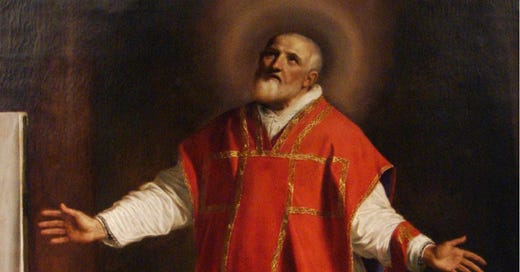St. Philip Neri was famous for hearing confessions for hours on end. Which might sound like a downer, but Pope St. John Paul II called him "the saint of joy,” not because of the sins he heard but the forgiveness the believers received.
Today’s Psalm and Gospel are about forgiveness.1 The psalms talk about forgiveness in a broad, abstract way, but Jesus shows us what it’s like to personally forgive someone. He looks Peter in the eye and not only forgives him, but gives him responsibility over the entire Church. Jesus demonstrates not just trust in Peter, but faith in the act of forgiveness itself.
Reading 1
Acts 25:13b-21
King Agrippa and Bernice arrived in Caesarea on a visit to Festus. Since they spent several days there, Festus referred Paul's case to the king, saying, "There is a man here left in custody by Felix. When I was in Jerusalem the chief priests and the elders of the Jews brought charges against him and demanded his condemnation. I answered them that it was not Roman practice to hand over an accused person before he has faced his accusers and had the opportunity to defend himself against their charge. So when they came together here, I made no delay; the next day I took my seat on the tribunal and ordered the man to be brought in. His accusers stood around him, but did not charge him with any of the crimes I suspected. Instead they had some issues with him about their own religion and about a certain Jesus who had died but who Paul claimed was alive. Since I was at a loss how to investigate this controversy, I asked if he were willing to go to Jerusalem and there stand trial on these charges. And when Paul appealed that he be held in custody for the Emperor's decision, I ordered him held until I could send him to Caesar."
Roman officials, like Festus and his predecessor Felix, have no idea what to do with Paul. The Jewish elders can’t seem to figure it out, either. Paul was thus, in some ways, the perfect Apostle to the gentiles, moving freely from one culture to the other, outsmarting one by appealing to the other, and then vice versa.
Responsorial Psalm
Ps 103:1-2, 11-12, 19-20ab
R. The Lord has established his throne in heaven.
Bless the LORD, O my soul;
and all my being, bless his holy name.
Bless the LORD, O my soul,
and forget not all his benefits.
R. The Lord has established his throne in heaven.
For as the heavens are high above the earth,
so surpassing is his kindness toward those who fear him.
As far as the east is from the west,
so far has he put our transgressions from us.
R. The Lord has established his throne in heaven.
The LORD has established his throne in heaven,
and his kingdom rules over all.
Bless the LORD, all you his angels,
you mighty in strength, who do his bidding.
R. The Lord has established his throne in heaven.
Forgiveness isn’t exactly popular in today’s culture, which is why memes like this are constantly floating around—
But God’s forgiveness is incomprehensibly larger than our own. We can’t begin to forgive on the level He does, in part because we don’t even realize how much forgiveness we require. Instead, we try to put things in “context”.
But on an infinite scale of God’s goodness, there is not “context.” It’s all sin, and it all needs to be forgiven.
Alleluia
Jn 14:26
R. Alleluia, alleluia.
The Holy Spirit will teach you everything
and remind you of all I told you.
R. Alleluia, alleluia.
Sometimes the Holy Spirit will bring about new revelations, but sometimes the Advocate will just remind us of stuff we already know. Probably more often than we’d like to admit.
Gospel
Jn 21:15-19
After Jesus had revealed himself to his disciples and eaten breakfast with them, he said to Simon Peter, "Simon, son of John, do you love me more than these?"
Simon Peter answered him, "Yes, Lord, you know that I love you."
Jesus said to him, "Feed my lambs."
He then said to Simon Peter a second time, "Simon, son of John, do you love me?"
Simon Peter answered him, "Yes, Lord, you know that I love you."
He said to him, "Tend my sheep."
He said to him the third time, "Simon, son of John, do you love me?"
Peter was distressed that he had said to him a third time, "Do you love me?" and he said to him, "Lord, you know everything; you know that I love you."
Jesus said to him, "Feed my sheep. Amen, amen, I say to you, when you were younger, you used to dress yourself and go where you wanted; but when you grow old, you will stretch out your hands, and someone else will dress you and lead you where you do not want to go."
He said this signifying by what kind of death he would glorify God. And when he had said this, he said to him, "Follow me."
This passage is after the Resurrection, after Jesus has appeared to several disciples. Now, as He prepares to ascend to Heaven, He must establish His Church on Earth until the Second Coming.
Peter was always the leader of the group, but first, Jesus has to clear the air. Jesus asks him three times if he loves Him.
Peter is a little freaked out by this, understandably. Does Jesus not believe him? I’m sure he remembers giving Jesus reason to doubt—Peter denied Jesus three times before the sun rose on Good Friday.
Jesus responds to Peter’s assurances by basically saying “prove it.” Lead the church, and take care of them. Die for them, as verse 18 implies.
I do wonder how many popes that line has haunted. Going from a priest to a bishop to a cardinal to the vicar of Christ. They’ve all been dressed by someone, and likely led to somewhere they didn’t want to go (even if they weren’t exactly martyred like St. Peter). It’s a lot.
Which is why Jesus chose Peter. John was His closest friend, but He knew Peter was a solid rock on which he could build His Church. Pray for Pope Francis, and every pope, that he can do the same.
The first reading is a weird, mid-point in Paul’s journey.






